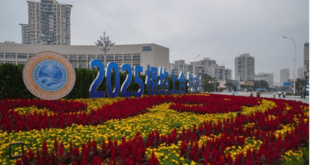Dr. Shehab Al-Makahleh
In recent years, the discourse surrounding the expansionist dream of “Greater Israel” has reemerged with unsettling prominence within Israeli politics. Figures like Finance Minister Bezalel Smotrich, a key representative of Religious Zionism, are now vocal proponents of a vision that stretches well beyond the borders of Israel, the West Bank, and Gaza. This ideology, rooted in biblical prophecy, envisions Israeli control over vast territories, extending even into parts of neighboring Arab countries. The revival of this long-standing notion raises critical concerns for regional stability, international relations, and the future of Israeli-Palestinian coexistence.
Historical Context and Ideological Underpinnings
The concept of “Greater Israel” is deeply embedded in a biblical narrative that purports a divine promise of land from the Nile to the Euphrates. While this religious interpretation has existed for millennia, it was only after the establishment of Israel in 1948 that the ideology began to influence political action, used to justify territorial expansion and the displacement of Palestinian communities. This dream found expression in the rhetoric of Israel’s founding leaders like David Ben-Gurion, though it has since evolved in alignment with right-wing political movements.
The Six-Day War in 1967 reignited this aspiration, as Israel’s occupation of the West Bank, Gaza, and East Jerusalem laid the groundwork for settlement expansion. Fueled by a blend of religious conviction and nationalist fervor, the ideology of Greater Israel began to solidify within segments of the Israeli populace, offering a religious rationale for expansionist policies. Religious Zionism, a movement intertwining Judaism with territorial nationalism, has since been a dominant force pushing for settlement expansions and an uncompromising stance on the Palestinian question.
The Rise of Religious Zionism
In the late 20th century, Religious Zionism began to infiltrate Israel’s political and military institutions. With the rise of the Likud Party and its alliances with religious factions, the ideology of Greater Israel moved from the fringes to the center of Israeli political life. The coalition government led by Benjamin Netanyahu has further legitimized these ideas, placing figures like Bezalel Smotrich and Itamar Ben-Gvir in positions of significant influence. Their policies, characterized by extremist rhetoric, threaten the foundational principles of democracy, human rights, and regional stability.
Smotrich, in particular, has openly advocated for the annexation of Palestinian territories and the expulsion of Palestinians—an agenda that elevates territorial expansion above peaceful coexistence. His statements reflect the broader rise of Religious Zionism, emboldened by a political climate that increasingly prioritizes expansionism over diplomacy. This resurgence of the dream of Greater Israel signals a dangerous turn in Israeli politics, one that not only endangers Palestinians but also risks unraveling decades of fragile peace efforts with Arab neighbors.
Geopolitical Implications
The revival of the Greater Israel ideology carries profound geopolitical consequences, especially for the stability of the Middle East. Calls for annexation of Palestinian territories, coupled with aspirations to control regions historically tied to Jordan, Syria, and Lebanon, threaten to escalate conflicts on multiple fronts. This vision closely aligns with the controversial Oded Yinon plan, which advocates for the fragmentation of Arab states to ensure Israeli dominance in the region. Such ambitions, if pursued, could lead to the systematic undermining of Arab state sovereignty, further destabilizing an already volatile region.
For Israel’s neighbors, the revival of Greater Israel evokes fears of territorial incursions, military confrontations, and the fracturing of Arab unity. These ambitions risk sparking widespread unrest, particularly in Jordan, Lebanon, and Syria—states already grappling with internal strife and external pressures. Furthermore, such expansionist policies may provoke retaliatory actions from regional powers like Iran and Hezbollah, amplifying the cycle of violence that has plagued the region for decades.
The international community, particularly the United States and European Union, must now reassess their roles in the Middle East. Continued passive support, or failure to address these expansionist policies, will only embolden Israel’s radical elements. As tensions escalate, global powers face the challenge of balancing their alliances with Israel against their broader commitments to peace and stability in the region.
The Path Forward: A Call for Dialogue and Reconciliation
To avert a new cycle of violence, Israeli leadership must reconsider its course. The expansionist agenda driven by Religious Zionism threatens to isolate Israel on the global stage and undermine its moral standing. Only by prioritizing dialogue, reconciliation, and respect for human rights can Israel chart a sustainable path toward peace.
The two-state solution, while fraught with challenges, remains the most viable framework for resolving the Israeli-Palestinian conflict. The international community must intensify its efforts to support Palestinian rights and advocate for an equitable resolution. At the same time, the voices of moderates within Israel, along with Palestinian leaders willing to engage in constructive dialogue, must be amplified to counter the rising tide of extremism.
The global community also has a crucial role to play. By mediating this conflict with a focus on justice, equality, and the rule of law, international actors can help dismantle the ideological barriers that have long fueled the conflict. A unified and sustained effort is necessary to address the root causes of the Israeli-Palestinian struggle—occupation, displacement, and inequality. Without addressing these foundational issues, any hope for lasting peace will remain elusive.
Conclusion
The return of the dream of “Greater Israel” poses a grave threat not only to Palestinians but to the very future of Israel as a democratic state. Religious Zionism, with its radical territorial ambitions, risks plunging the region into deeper chaos and alienating Israel from its allies. This ideology’s unchecked rise could precipitate a crisis that will have far-reaching consequences for regional stability and global peace efforts.
Israel must now decide: will it continue down a path of exclusion and expansion, or will it embrace the values of dialogue, reconciliation, and respect for human rights? The answer to this question will shape not only the future of the Middle East but the moral legacy of Israel itself.
 Geostrategic Media Political Commentary, Analysis, Security, Defense
Geostrategic Media Political Commentary, Analysis, Security, Defense





